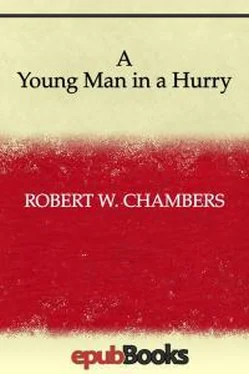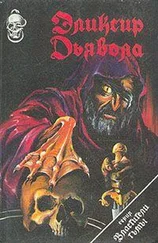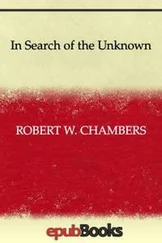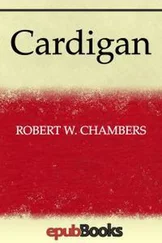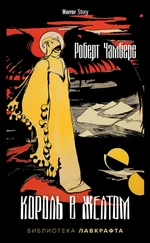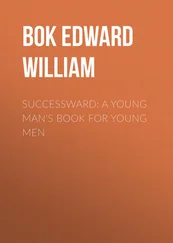Роберт Чамберс - A Young Man in a Hurry
Здесь есть возможность читать онлайн «Роберт Чамберс - A Young Man in a Hurry» весь текст электронной книги совершенно бесплатно (целиком полную версию без сокращений). В некоторых случаях можно слушать аудио, скачать через торрент в формате fb2 и присутствует краткое содержание. Год выпуска: 2014, Издательство: epubBooks Classics, Жанр: Классическая проза, на английском языке. Описание произведения, (предисловие) а так же отзывы посетителей доступны на портале библиотеки ЛибКат.
- Название:A Young Man in a Hurry
- Автор:
- Издательство:epubBooks Classics
- Жанр:
- Год:2014
- ISBN:нет данных
- Рейтинг книги:5 / 5. Голосов: 1
-
Избранное:Добавить в избранное
- Отзывы:
-
Ваша оценка:
- 100
- 1
- 2
- 3
- 4
- 5
A Young Man in a Hurry: краткое содержание, описание и аннотация
Предлагаем к чтению аннотацию, описание, краткое содержание или предисловие (зависит от того, что написал сам автор книги «A Young Man in a Hurry»). Если вы не нашли необходимую информацию о книге — напишите в комментариях, мы постараемся отыскать её.
A Young Man in a Hurry — читать онлайн бесплатно полную книгу (весь текст) целиком
Ниже представлен текст книги, разбитый по страницам. Система сохранения места последней прочитанной страницы, позволяет с удобством читать онлайн бесплатно книгу «A Young Man in a Hurry», без необходимости каждый раз заново искать на чём Вы остановились. Поставьте закладку, и сможете в любой момент перейти на страницу, на которой закончили чтение.
Интервал:
Закладка:
" Crawford, Sagamore Club :
"Ophir has consolidated with Steel Plank. You take charge of London office. Make arrangements to catch steamer leaving a week from to–morrow. Garcide and I will be at Sagamore to–night. JAMES J. CRAWFORD."
He sat staring at the telegram; she, vaguely apprehensive for the safety of this new happiness of hers, clasped her hands tightly in her lap and waited.
"Any answer, sir?" asked the steward.
Crawford took the offered telegram blank and mechanically wrote:
"Instructions received. Will expect you and Garcide to–night.
JAMES CRAWFORD."
She sat, twisting her fingers on her knees, watching him in growing apprehension. The steward took the telegram.
Crawford looked at her with a ghastly smile.
They rose together, instinctively, and walked to the porch.
"Oh yes," he said, under his breath, "such happiness was too perfect. Magic is magic—it never lasts."
"What is it?" she asked, faintly.
He picked up his cap, which was lying on a chair.
"Let's get away, somewhere," he said. "Do you mind coming with me—alone?"
"No," she said.
There was a canoe on the river–bank below the lawn. He took a paddle and setting–pole from the veranda wall, and they went down to the river, side by side.
Heedless of the protests of the scandalized belted kingfishers, they embarked on Sagamore Water.
The paddle flashed in the sunlight; the quick river caught the blade, the spray floated shoreward.
V
Late in the afternoon the canoe, heavily festooned with dripping water–lilies, moved like a shadow over the shining sands. The tall hemlocks walled the river with palisades unbroken; the calm water stretched away into the forest's sombre depths, barred here and there by dusty sunbeams.
Over them, in the highest depths of the unclouded blue, towered an eagle, suspended from mid–zenith. Under them the shadow of their craft swept the yellow gravel.
Knee to knee, vis–à–vis, wrapped to their souls in the enchantment of each other, sat the entranced voyagers. Their rods lay idle beside them; life was serious just then for people who stood on the threshold of separation.
"I simply shall depart this life if you go to–morrow," she said, looking at him.
The unfeigned misery in his face made her smile adorably, but she would not permit him to touch her.
"See to what you have brought me!" she said. "I'm utterly unable to live without you. And now what are you going to do with me?"
Her eyes were very tender. He caught her hand and kissed it, and laid it against his face.
"There is a way," he said.
"A way?"
"Shall I lead? Would you follow?"
"What do you mean?" she asked, amused.
"There is a way," he repeated. "That thread of a brook leads to it."
He pointed off to the westward, where through the forest a stream, scarcely wider than the canoe, flowed deep and silent between its mounds of moss.
He picked up the paddle and touched the blade to the water; the canoe swung westward.
"Where are you taking me?" she asked.
But the canoe was already in the narrow stream, and he was laughing recklessly, setting–pole poised to swing round the short turns.
"If we turned back now," she said, "it would be sunset before we reached the club."
"What do we care?" he laughed. "Look!"
Without warning, a yellow glory broke through the trees, and the canoe shot out into a vast, flat country, drenched with the rays of the sinking sun.
Blue woods belted the distance; all in front of them was deep, moist meadow–land, carpeted with thickets of wild iris, through which the stream wound in pools of gold.
The beauty of it held her speechless; the spell was upon him, too, and he sat motionless, the water dripping from his steel–tipped setting–pole in drops of fire.
There was a figure moving in the distant meadow; the sun glimmered on something that might have been a long reed quivering.
"An old friend fishing yonder," he said, quietly; "I knew he would be there." He touched her and pointed to the distant figure. "That is the parson of Foxville," he said. "We will need him before we go to London."
She looked across the purple fields of iris. Suddenly his meaning flashed out like a sunbeam.
"Do—do you wish—that— now ?" she faltered.
He picked up the paddle; she caught his hand, trembling.
"No, no!"—she whispered, with bent head—"I cannot; don't take me so—so quickly. Truly we must be mad to think of it."
He held the paddle poised; after a while her hand slid from the blade and she looked up into his eyes. The canoe moved on.
"Oh, we are quite mad," she said, unsteadily.
"I am glad we are," he said.
The mellow dip! dip! of the paddle woke the drowsing red–winged blackbirds from the reeds; the gray snipe wheeled out across the marsh in flickering flight.
The aged parson of Foxville, intent on his bobbing cork, looked up in mild surprise to see a canoe, heavily hung with water–lilies, glide into his pool and swing shoreward.
The parson of Foxville was a very old man—almost too old to fish for trout.
Crawford led him a pace aside, leaving Miss Castle, somewhat frightened, knee–deep in the purple iris.
Then the old parson came toddling to her and took her hand, and peered at her with his aged eyes, saying, "You are quite mad, my child, and very lovely, and very, very young. So I think, after all, you would be much safer if you were married."
Somebody encircled her waist; she turned and looked into the eyes of her lover, and still looking at him, she laid her hands in his.
A wedding amid the iris, all gray with the hovering, misty wings of moths—that was her fate—with the sky a canopy of fire above her, and the curlew calling through the kindling dusk, and the blue processional of the woods lining the corridors of the coming night.
And at last the aged parson kissed her and shook hands with her husband and shambled away across the meadows.
Slowly northward through the dusk stole the canoe once more, bearing the bride of an hour, her head on her husband's knees. The stars came out to watch them; a necklace of bubbles trailed in the paddle's wake, stringing away, twinkling in the starlight.
Slowly through the perfumed gloom they glided, her warm head on his knees, his eyes fixed on the vague water ahead.
A stag crashed through the reeds ashore; the June fawn stared with eyes like rubies in the dark.
Onward, onward, through the spell–bound forest; and at last the windows of the house glimmered, reflected in the water.
Garcide and Crawford awaited them on the veranda as they came up, rising in chilling silence, ignoring the offered hands of greeting.
"I've a word to say to you," snarled the Hon. John Garcide, in his ward's ear—"and another word for your fool of an aunt!"
She shrank back against her husband, amazed and hurt. "What do you mean?" she stammered; "we—we are married. Will you not speak to my—my husband?"
A silence, too awful to last, was broken by a hoarse laugh.
"You're all right, Jim," said the elder Crawford, slowly. "Ophir Steel won't slip through your fingers when I'm under the sod. Been married long, Jim?"
The Fire-warden
I
"And of course what I buy is my own," continued Burleson, patiently. "No man here will question that, I suppose?"
For a moment there was silence in the cross–roads store; then a lank, mud–splashed native arose from behind the stove, shoving his scarred hands deep into the ragged pockets of his trousers.
"Young man," he said, harshly, "there's a few things you can't buy; you may think you can buy 'em—you may pay for 'em, too—but they can't be bought an' sold. You thought you bought Grier's tract; you thought you bought a lot o' deer an' birds an' fish, several thousand acres in timber, and a dozen lakes. An' you paid for 'em, too. But, sonny, you was took in; you paid for 'em, but you didn't buy 'em, because Grier couldn't sell God's free critters. He fooled ye that time."
Читать дальшеИнтервал:
Закладка:
Похожие книги на «A Young Man in a Hurry»
Представляем Вашему вниманию похожие книги на «A Young Man in a Hurry» списком для выбора. Мы отобрали схожую по названию и смыслу литературу в надежде предоставить читателям больше вариантов отыскать новые, интересные, ещё непрочитанные произведения.
Обсуждение, отзывы о книге «A Young Man in a Hurry» и просто собственные мнения читателей. Оставьте ваши комментарии, напишите, что Вы думаете о произведении, его смысле или главных героях. Укажите что конкретно понравилось, а что нет, и почему Вы так считаете.
